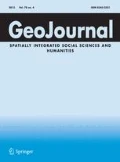Abstract
Until 1989 the ethnic Germans tended to live in Kazakhstan, Central Asia and South-West Siberia. Not only German but also Russian and Ukrainian residents in Kazakhstan and Central Asia have been induced to leave. In South-West Siberia attempts are beeing made to keep the ethnic Germans there. Two autonomous German districts have been established. The mass scale emigration to Germany has, however, affected these areas, too. That means that not only push factors are effective but also pull factors play a role. They concern the privileged immigrant status of “Aussiedler” in Germany. The economic damage suffered by Siberia on account of this kind of undifferentiated drain of workers and specialists puts whole economic regions in jeopardy. The German Home Office tried to support the re-establishment of the German Volga Republic which was dissolved by Stalin in 1941. Some German unprofessionally organised economic projects and severe diplomatic mistakes actually strengthened the nationalistic Russian opposition so that the reestablishment failed. An improvement of the ethnic Germans' perspectives in the CIS is only possible if Germany makes use of the tried and tested instruments of development aid and regional planning. German consulates and trade agencies should be opened in the Volga region, and in Siberia. It is necessary to establish a Siberian-German bank and Russian-German universities. A special programme should provide support for well-qualified people whose knowledge and skills are vital for a continuation of the ethnic Germans' economy and culture.
Similar content being viewed by others
References
Biryukova, M.: Reabilitirovat ⋯ posmertno? (Rehabilitate ⋯ posthum?) Volga-Ural 33 (September 26, 1992)
CNII gradostroitelstva, Saratovgrazhdanproyekt (eds.): Prognoz chislennosti i rasseleniya nemeckogo naseleniya (Prognosis of the number and settlement of German population). Two maps. Moscow, Saratov 1992.
Dietz, B.; Hilkes, P.: Rußlanddeutsche — Unbekannte im Osten. Geschichte, Situation, Zukunftsperspektiven. (Russian Germans — unfamiliar people in the East. History, situation, future) Olzog-Verlag, München 1992.
Davydov, E.; Rikhter, G.; Vinogradov, K.: Nemtsev Povolzhya Avtonomnaya Sovetskaya Sotsialisticheskaja Respublika. (The Autonomuos Socialist Soviet Republik of Volga-Germans). Bol'sh.. Sov. Entsikl. vol. 41, col 593–604, Moscow 1939.
Häusser, O.; Kapinos, A.; Christ, R.: Die Statusfeststellung nach dem Bundesvertriebenengesetz. Ein Kommentar zu den wesentlichen, im Zusammenhang mit der Statusfeststellung für Vertriebene/Aussiedler und Sowjetzonenflüchtlinge stehenden Vorschriften (Determination of status in accordance with the Federal Law on Exile Issues. A commentary on the essential directives in connection with the status determination of refugees/exiles/Aussiedler and refugees from the Soviet zone). Kohlhammer, Suttgart 1990.
Klaube, M.: Die deutschen Dörfer in der westsibirischen Kulunda-Steppe. Entwicklung, Strukturen, Probleme (The German villages in the West Siberian Kulunda steppe. Development, structures, problems). (= Schriftenreihe der Kommission für ostdeutsche Volkskunde, vol. 57). Elwert-Verlag, Marburg 1991.
Klüter, H.: Die Deutschstämmigen Sibiriens zwischen regionaler Autonomie und Auswanderung (Regional autonomy or emigration — the situation of ethnic Germans in Siberia). Geographische Zeitschrift 80, 129–148 (1992)
Klüter, H.; Klüter, N.: Rossijskie nemtsy. Problemy pereseleniya i razvitiya etnicheskoy obshchnosti s zapadnoy tochki zreniya (People of German descent in CIS-States. Problems of migration and development from a Western point of view.) Paper presented to the seminar “Nemtsy v Sibiri” in Novosibirsk, April 13th, 1993.
Mel'nikov, A. N. et al.: Svodnyj analiticheskij otchet k voprosu ob obrazovaniyem nemetskoy natsionalnoy avtonomii na Altaye (Final report on the question of formation of a German National Territory in the Altay region). Barnaul 1990.
Protokoll über die Zusammenarbeit zur stufenweisen Wiederherstellung der Staatlichkeit der Rußlanddeutschen (Document on the co-operation to gradually re-establish the nationality of Germans in Russia). “Frankfurter Allgemeine Zeitung” p. 6 (29-04-1992)
“Spiegel”-Magazine: Im Prinzip Geschenke. Steuergeld, das Rußlanddeutsche zum Bleiben ermuntern sollte, versickerte in den Kassen eines deutschen Vereins (Presents in principle. Taxes that were intended to encourage ethnic Germans to stay in Russia disappear in the funds of a Western German association. “Der Spiegel” 35, 24–25 (24-08-1992)
Volgogradgrazhdanproyekt (ed.): Ekspress-skhema i teknikoekonomicheskoye obosnovaniye raseleniya i razmeshcheniya proizvoditelnykh sil na territorii Zhirnovskogo, Kotovskogo, Staropoltavskogo i Pallasovskogo rayonov Volgogradskoy oblasti v ramkakh programmy sozdaniya Nemetskogo natsionalnogo okruga. (Express planning scheme and technical-economic foundation for settlement and economic development in the rayons Zhirnovsk, Kotovo, Staraya Poltavska and Plasovska of the oblast Volgograd as a part of the programme of founding a German national okrug) 3 volumes. Volgograd 1992.
Author information
Authors and Affiliations
Rights and permissions
About this article
Cite this article
Klüter, H. People of German descent in CIS States — areas of settlement, territorial autonomy and emigration. GeoJournal 31, 419–434 (1993). https://doi.org/10.1007/BF00812795
Issue Date:
DOI: https://doi.org/10.1007/BF00812795



